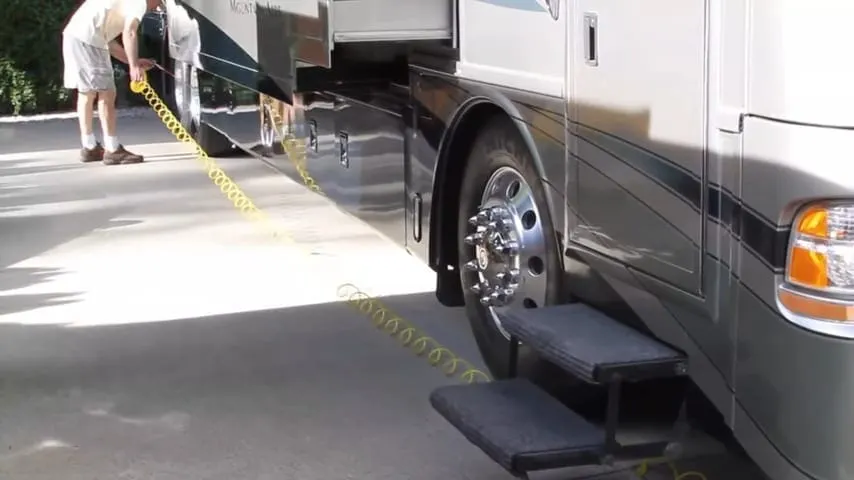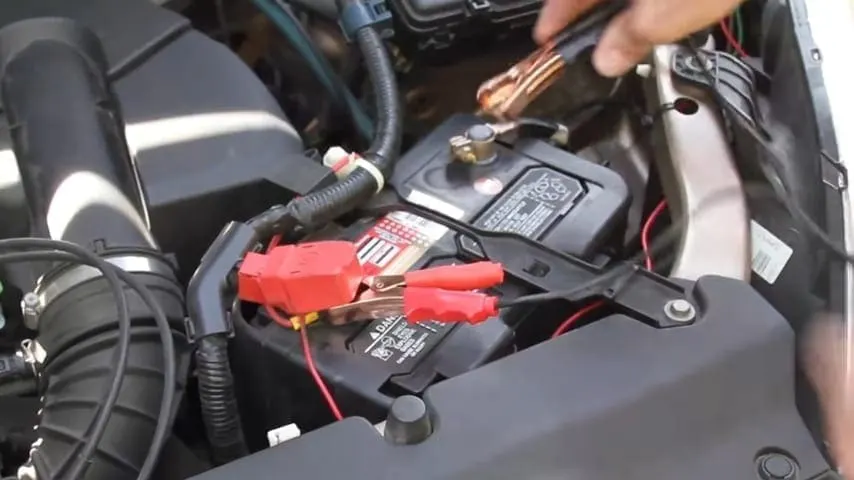When you’re driving or hauling an RV down the road and you discover that one of your tires is low on air, it’s not always convenient to find a gas station air hose that’s easily accessible to your large vehicle. Or imagine being camped on the shores of a tranquil mountain lake, and you decide it’s time for a peaceful paddle across the water. You’d probably appreciate not having to spend too much time foot-pumping your inflatable kayak. It might be time to consider adding an RV air compressor to your equipment inventory.
Air compressors are extremely adaptable, both at campsites and on the road. Not only will they help to keep all those tires safely rolling, but they can be used to power pneumatic tools, inflate sports equipment, and even clean the dirt off your outdoor camp rug.
Most air compressors can even enable you to winterize your RV’s plumbing! Click on the photo below to see our complete video tutorial on how we winterize our RV water lines with our Viair 400P-RV air compressor and Viair’s handy winterizing kit:
We’ve collected several tips to keep in mind as you shop for the right RV air compressor for you.
What to Look for When Buying an RV Air Compressor
Maximum and Minimum PSI
How many psi (pounds per square inch) of pressure can the compressor generate? First, you’ll want to know the required psi for the types of tires and equipment you have. For instance, the manufacturer’s inflation tables for your RV tires might call for 80 psi based on the weight they’re carrying, but your car tires may need 32 psi, while your bike might need 65 psi. Will the compressor be able to meet all your needs?
Duty Cycle
Most small air compressors need a recovery period to cool down after running for a certain amount of time. This running-then-resting time is called the “duty cycle” and it’s usually expressed in percentages of an hour. For example, a compressor’s duty cycle may be listed at 33%. This means it can run for 20 minutes out of every hour. A compressor rated at a 50% duty cycle can run for 30 minutes out of every hour. A 100% duty cycle means the compressor can run continuously for up to one hour before needing a cool-down period.
Hose Length

Make sure your air compressor offers a sufficient length of hose to allow you to reach all of your RV’s tires!
Many shoppers forget to take the hose length into consideration when purchasing a compressor, which can be a frustrating oversight. If the compressor runs on 120 volts, the hose may need to be quite long to run from the electrical outlet to your tires or equipment.
You may be able to plug it into the cigarette lighter of the vehicle you will be servicing, but in general, a longer hose is always better, especially when the length of your RV is taken into consideration. Bear in mind that even when using 12-volt power, the compressed air may need to reach to the furthest tire on your rig from the battery or outlet you’re using to power it. Many of the best RV air compressors are portable and have 30’ to 60’ long hoses to meet your needs.
Weight
Lighter duty compressors are usually also lighter in weight (and lower in cost). Weight can be a deciding factor when considering where you might be using the compressor and how it’s transported. Some compressors can weigh more than 30 lbs., which could make it difficult to maneuver in and out of an RV. Additionally, it could add some fairly significant weight to your rig.
Power

Some air compressors allow you to connect directly to your vehicle’s battery for power!
Most portable air compressors work on 12 volt (DC) power. They plug into a 12-volt plug on a vehicle or attach directly to a battery with clamps. 120 volt (AC) powered compressors are usually more stationary and are great for use in garages. Both types of air compressors can be useful for filling up footballs, bike tires, kayaks, etc. Decide how you will be using your compressor before you narrow down your choices.
How Does an RV Air Compressor Work?
Taking in the air from the atmosphere and pressurizing it is an air compressor’s job. It does this by creating a vacuum to draw in air. Using a motor run by electric, gas, or diesel power, the air is forced through an opening in the compressor to build up pressure. This compressed air is released through a hose that’s used to fill tires, power paint sprayers, inflate toys, etc.
To learn how to inflate your RV tires the easy way, watch our complete video tutorial!
Best RV Air Compressors
Let’s have a look at some great RV air compressors for motorhomes and trailers, as well as a bonus budget-friendly option.
Viair 45053 450P-RV Automatic Portable Compressor Kit
The 450P-RV is the big boy of portable air compressors and a good choice for large motorhomes. It’s capable of the high pressures often needed by big diesel pushers and has a 100% duty cycle (so it can run longer to add more air). It also offers long hoses to reach tires further from the electrical connection, perfect for a Big Rig. The specs offered on this model include:
- 150 PSI
- Duty Cycle: 100%
- Weight: 15 lbs.
- Hose: up to 60’ in length
- Price: Averages around $350
- Compatible with the Viair Winterization Kit that you can use to blow out your water lines
- PORTABLE *AUTOMATIC* COMPRESSOR for RVs & TRAILERS (Model: 40047, 150 PSI, Any Tire Size) - Hit the open road with an ultra reliable 12V air...
- POWER YOUR JOURNEY: Versatile Air Compressor for RVs & More. The 450P-RV Portable RV Air Compressor is your go-to solution for inflating tires on RVs,...
Or buy the latest “RVS” model from MobileMustHave.com and save 5%!
Thanks to the latest additions to our RV internet arsenal from MobileMustHave, we're able to stay connected more reliably... and more remotely... than we ever could before. We couldn't be happier...Show More
Thanks to the latest additions to our RV internet arsenal from MobileMustHave, we're able to stay connected more reliably... and more remotely... than we ever could before. We couldn't be happier with the equipment we now have!
Upgrade your RV internet connectivity with great products from Peplink, WeBoost, Parsec, Poynting, Mobile Mark, and more. And while you're there, look at other great products like Viair Compressors!
Watch our video about our RV internet connectivity solutions for 2021
Save 5% on your equipment order at MobileMustHave.com when you click the button on this deal or use discount code "RVGEEKS" at checkout!
Show LessViair 40047 400P-RV Automatic Portable Compressor Kit
The 400P-RV is our personal choice, and the one we’ve been using, and loving, for years. We’ve been asked why we’d want this one vs the 450P-RV, since it only has a 33% duty cycle compared to the 450P’s 100%, and it’s lower-priced, so must be lower end. There are a few reasons.
First, the flow rate is higher. The 400P-RV produces 2.30 CFM (cubic feet per minute), while the 450P-RV produces only 1.8 CFM. That means the 400 adds air faster. The 400 also weighs slightly less than the 450.
Since we only use our compressor to top up pressures as needed, rather than fill an entire tire from empty, we don’t need a 100% duty cycle. And since the 400P-RV tops up tires at a faster rate (higher CFM), we spend less time at each wheel position, with the compressor having some time to cool down as we move from tire to tire. And it can still handle the same high 150 PSI pressures that large diesel pushers demand, just like the 450.
The one instance where we’d suggest switching to the 450P-RV is if you do a lot of off-roading, and need to drop your Jeep’s tire pressure way down to give them extra traction in sand or other loose material. Filling each tire back up from very low can require a large amount of air volume, and being able to run the 450 for an entire hour uninterrupted gives that model the nod for off-road enthusiasts.
The 400 does everything we need, and it’s a great bonus that it’s less expensive than the 450, while even providing faster tire filling. The specs offered on this model include:
- 150 PSI
- Duty Cycle: 33%
- Weight: 11 lbs.
- Hose: Up to 60’ in length
- Price: Averages around $300
- Compatible with the Viair Winterization Kit that you can use to blow out your water lines
- PORTABLE *AUTOMATIC* COMPRESSOR for RVs & TRAILERS (Model: 40047, 150 PSI, Class C Tires) - Hit the open road with a reliable 12V air compressor,...
- POWER YOUR JOURNEY: Versatile Air Compressor for RVs & More. The 400P-RV Portable RV Air Compressor is your go-to solution for inflating tires on RVs,...
Viair 300P Portable Compressor
This model might be a good choice for budget shoppers. At less than half the cost of the 450P-RV model, it comes with the same PSI power. And while it offers a lower duty cycle and a shorter hose appropriate for smaller RVs, it only weighs nine pounds. The specs offered on this model include:
- 150 PSI
- Duty Cycle: 33%
- Weight: 9 lbs.
- Hose: 25’ long
- Price: $152
- Note: NOT compatible with the Viair Winterization Kit
- PORTABLE OFFROAD COMPRESSOR (Model: 30033, 150 PSI, 33" Tires) - The 300P Portable Truck Air Compressor is 12V heavy-duty electric air compressor for...
- EXPLORE WITHOUT LIMITS: Trucks, SUVs, Jeeps, Offroad Vehicles, 4x4s, Side-by-Sides, RVs, Motorcycles, Road Bikes & Mountain Bikes. *Instructions:...
Conclusion
Adding an RV air compressor to your lineup of dependable tools is a smart move. It gives you peace of mind regarding safe travel while providing the functionality you need for both work and recreation. The portable models are lightweight and small, making them the perfect stowaway equipment for any sized RV. And they might come in handy when you least expect it!
Geek Out With Us Every Week
Join our newsletter to learn about all things RV-related. Every week we offer free tips, tricks, product reviews, and more to our online community of RVers. Whether this is your first time on the road or you’re a seasoned expert, we’d love for you to geek out with us!







Dan
Saturday 26th of November 2022
My DP has onboard compressed air for the brakes and a connection point for an air hose up near the generator. Is this type of air safe to winterize with or does it have a lot of contaminants?
John
Sunday 23rd of January 2022
A quick observation for offroaders on the Viair 40047 400P:
We bought this compressor on the Wynn’s recommendation (I bet they talked with y’all! :-) ), and have been very happy with it.
Since we don’t have bead locks, we only air down to 15PSI or so. In our experience, this compressor works well when it’s time to air back up, and the duty cycle has never been an issue. For someone airing down to 10PSI or less, it might be.
Tim Howlett
Wednesday 29th of December 2021
While the VIAIR does look like a great solution- in other words, the best overall balance of utility, size, weight and cost- but I’m just wondering if I would be ok using a small “pancake” type household /garage compressor? In my case, I easily have the space and weight allowance for it, plus I have my onboard generator in case shore power is not available, so I’m OK with 110 AC instead of 12V DC power requirement. Wondering if others have gone this route and had any issues- aside from the obvious space and weight disadvantage, that is. Thanks for (yet another) thoughtful, well researched and clearly presented article.
TheRVgeeks
Wednesday 29th of December 2021
Hi Tim! If you have space and 120V power available, a pancake compressor will absolutely do the job in most cases, and save some money in the process. Besides space, price, and power availability, there are two other considerations to keep in mind. First of course is whether or not it has a high enough maximum pressure for your RV's tires. The second is whether you'll be using it to blow out your water lines to winterize. We prefer to avoid any tank-style compressor for that purpose, to be certain we don't blow any contaminants into the water system, which can come from the compressor's tank. The Viar is tankless and includes a built-in filter, so it's a safer bet for winterizing purposes. Hope this helps.
Richard Hubert
Wednesday 3rd of February 2021
While VIAR makes good air compressors, they are very expensive, and remain very low volume units, taking forever to inflates a large RV tire - such as the 22.5" tires on my Class A. Also makes them very slow in even inflating beach toys, inner tubes, etc. And - they often require a long extension cord for power.
My research and experience indicates that a much better, and less expensive option is one of the newer battery powered Air compressors - such as the Ryobi 18v cordless model. This unit not only has a max psi quite sufficient for my 100 psi tires, but it does not require any extension cord, and it has a 1 gallon air reserve tank to much more quickly inflate low pressure beach toys & kayaks. With its rechargeable batteries it can be used anywhere, and Ryobi products are supported at all Home Depot stores.
The bottom line is that - regardless of brand or style - the most important safety practice all RVers should follow is to maintain proper tire inflation levels, at all times. The best solution to monitor this is having a good TPMS installed, but short of that RVers should check - and adjust - all their tires when they set off on a travel day. And to do that having a handy, easy to use air compressor is an essential tool which all RVers should carry. (even if you have a TPMS).
Ryobi link - https://www.homedepot.com/p/RYOBI-18-Volt-ONE-Cordless-1-Gal-Portable-Air-Compressor-Tool-Only-P739/305269932?source=shoppingads&locale=en-US&mtc=Shopping-B-F_D25H-G-D25H-25_28_COMPRESSORS_AND_AIR_TOOL-Multi-NA-Feed-LIA-NA-NA-Compressors_LIA&cm_mmc=Shopping-B-F_D25H-G-D25H-25_28_COMPRESSORS_AND_AIR_TOOL-Multi-NA-Feed-LIA-NA-NA-Compressors_LIA-71700000065880649-58700005819508952-92700053176328111&gclid=CjwKCAiAsOmABhAwEiwAEBR0Zl1GudAAN5FMO9VKKB4JVqjQiqcwLLwx4r_IJ3MwdEeE5d53-kG1KRoCrLIQAvD_BwE&gclsrc=aw.ds
TheRVgeeks
Wednesday 3rd of February 2021
Thanks for the comment, Richard. This is a great example of the many ways there are to skin a cat, and the various needs that go into making a decision. We carry 110 PSI in our front tires, but have little need for high volume, as we're only ever topping up a few PSI, not filling from empty. We can add 5-10 PSI into our big 295/80R22.5 tires very quickly and move right on the the next tire. Also, since we rarely need our compressor, but need it quite a lot when we do fire it up (8 RV tires, plus the car), we like not having to depend on batteries being charged, or running them down during use.
Pat Parker
Wednesday 3rd of February 2021
Great product thanks
TheRVgeeks
Wednesday 3rd of February 2021
It sure is! Hope you're staying warm up there.